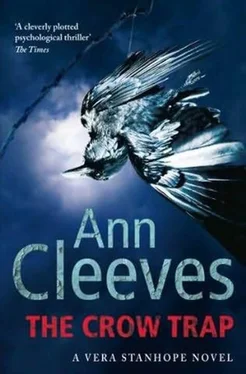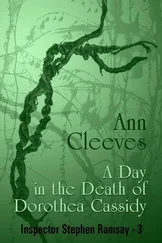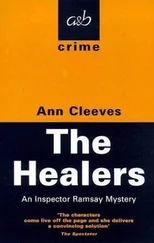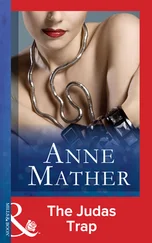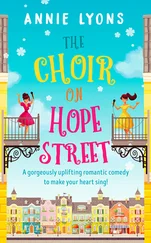
Ann Cleeves
The Crow Trap
The first book in the Vera Stanhope series, 1999
Rachael turned off the metal led road, then stopped with a jerk. There was a new tubular steel gate and she’d almost driven into it. One of the Holme Park tenants trying to impress. A ewe with a tatty coat and mucky behind nuzzled up to her as she got out of the car to open the gate. The ewe was fat. They didn’t lamb up here until the end of April. The steel of the latch was so cold that it seemed to freeze to her fingers.
The track was worse than she remembered, pitted by frost. She drove slower than walking pace with two wheels on the verge. Still the exhaust bumped against a rock.
A mile on she realized she had taken the wrong track through the forest. She should have come out from the trees into open countryside, should by now have reached the ford. Instead she was on a sandy path, not so uneven but very narrow. On either side conifers blocked out the evening light. She drove on, hoping for a place to turn but the track divided into a footpath, the trees meeting over her head.
She had to reverse back to where the track forked. Branches scraped against the paintwork with the noise of chalk on a wet blackboard. The bumper hit a stone bank hidden by undergrowth. She pushed the gear into first and moved forward with a jerk before reversing again. When she reached the main track it was almost dark and she was shaking.
At the ford she stopped the car and got out to test its depth. Five years ago a student on his way back to Baikie’s after a night in the pub had drowned, his car turned over by the force of the flash flood.
The car headlights reflected from the surface, making it impossible to gauge the depth. It had been a dry spring so she decided to risk it.
The water steamed and hissed as it hit the hot engine but she pulled out easily enough on the other side.
The track was blocked again by a gate, this time of wood. It was too dark to read but she knew there was a sign. Access to Black Law Farm and Baikie’s Cottage only. She left the engine running while she opened the gate. The car was parked on a slope so the headlights shone up at an angle onto the open hillside. A movement must have caught her attention because she looked up and saw, caught in the beam, the silhouette of a figure, dressed for walking in a Gortex jacket and hood. There was a flash of reflected light and she guessed he was carrying binoculars or a camera. She was certain it was a man though the figure was too far away to tell. He turned and disappeared into the gloom.
She had the unpleasant sense that she had been watched for some time.
As she drove the last half mile to the cottage she wondered who could be foolish enough to be out on the hill with so little light left.
Rachael decided not to call at the farm. It upset Dougie to be disturbed without warning. Bella would hear the car and come down to the cottage when Dougie was asleep if she got the chance. There was a light in the farmhouse kitchen but the curtains were drawn. The dogs barked loudly and chased from a barn into the yard. The noise seemed to echo round the hills and Rachael thought: that’s good. She’ll not miss that wherever she is. Then she saw the light upstairs and thought Bella was probably settling him down for the night.
She drove on through the yard which was scraped and clean. Baikie’s Cottage was at the end of the track with a view of the valley, surrounded by trees which had been planted over the years to give some shelter from the wind.
The key was where it always was, under an ornamental chimney pot near the back door. Inside she groped for the light switch. The house smelled damp but she knew it was clean. She had come in November, after the last of the students, to scrub out. Bella had arrived with a couple of bottles of homemade wine and they’d made a day of it. They’d ended up in the farmhouse drinking Dougie’s whisky. She slept in the guest room Neville’s room as Bella called it, though as far as she knew Neville hadn’t been there for years and had woken with the worst hangover of her life. It was the only time she’d ever slept in the farmhouse.
Rachael switched on the Calor Gas cylinder outside then went into the kitchen to put on the kettle for coffee. The kitchen was tiny a modern extension so narrow that she could touch both walls at once. She plugged in the rusty fridge, shut the door and was relieved when it began to hum. The gas flame spluttered but the kettle wasn’t even warm. While she waited for it to boil she walked through to the living room and shut the curtains to keep out the draught. Once they had been grey velvet but the sun had faded them in strips and now the pile was quite smooth. There was a sofa covered with an Indian bedspread which Rachael had brought the year before from home, a couple of armchairs which needed something to hide the stains, books spotted with mildew and in one corner a fox in a glass case. The surroundings were so familiar that Rachael took no notice of them. She thought only about getting warm. Even inside it was so cold now that her breath came in clouds.
The grate was laid with paper and kindling but there were no logs in the basket on the hearth. There were matches on the mantelpiece but they were damp. After several attempts to strike one Rachael twisted newspaper into a spill and lit it from the gas flame in the kitchen.
She nurtured the fire, remembering old tricks from the last time. The kettle squealed and she made instant coffee from an emergency jar she had brought in her bag. She drank it crouched over the fire, tending it until she was certain it would not go out.
She emptied the car then put a pan of water on the stove. She’d have pasta for supper, and a glass of the wine she planned to have with Bella later. She took out the basket to fetch some logs. They were stacked at the back of a high, open-fronted shed, which also housed a rusting tractor and some piled bales of straw. The lights from the house didn’t reach that far and she carried a torch. Outside it was clear and icily cold. The stars in the wide sky, unpolluted by street lamps, seemed brighter than at home.
Bella had arranged her suicide as efficiently as she had done everything else in her life. In the torchlight she swung, hanging from a noose made of strong, nylon rope. Her face was white. She had prepared for the occasion by putting on lipstick and the silk top Rachael had bought her as a thank-you present after last season. Her black shoes shone so the torchlight reflected from them. She’d pulled two bales away from the wall and climbed onto them to tie the rope round a beam. Then, when she was ready, she had kicked one away.
Of course there was a note. She had thought of that too. It was addressed to Rachael and apologized that she had to be the one to find the body: I couldn’t put Dougie through that and I knew you’d cope. It went on to remind Rachael that the kitchen door of the farmhouse was open so she’d be able to get to the phone without disturbing anyone meaning Dougie again. But there was no real explanation for the suicide. She just said that she couldn’t take any more. She had known that Rachael would find her before the end of the evening because she had left the log bucket empty. Rachael had always realized that Bella was a clever woman.
When Rachael saw Bella, swinging, recognizable by the silk top, the smartly per med hair, the lipstick, but not really Bella, because Bella had never been that still in her life, she was furious. She was out of her mind with anger. She wanted to use the body as a punch bag, to thump it in the stomach. She wanted to climb onto a bale and slap the white, lifeless face. Because Bella had been a friend. So what right did she have to do this without discussing it with Rachael first? And because, since she heard that the project would go ahead, Rachael had been looking forward to this evening.
Читать дальше
